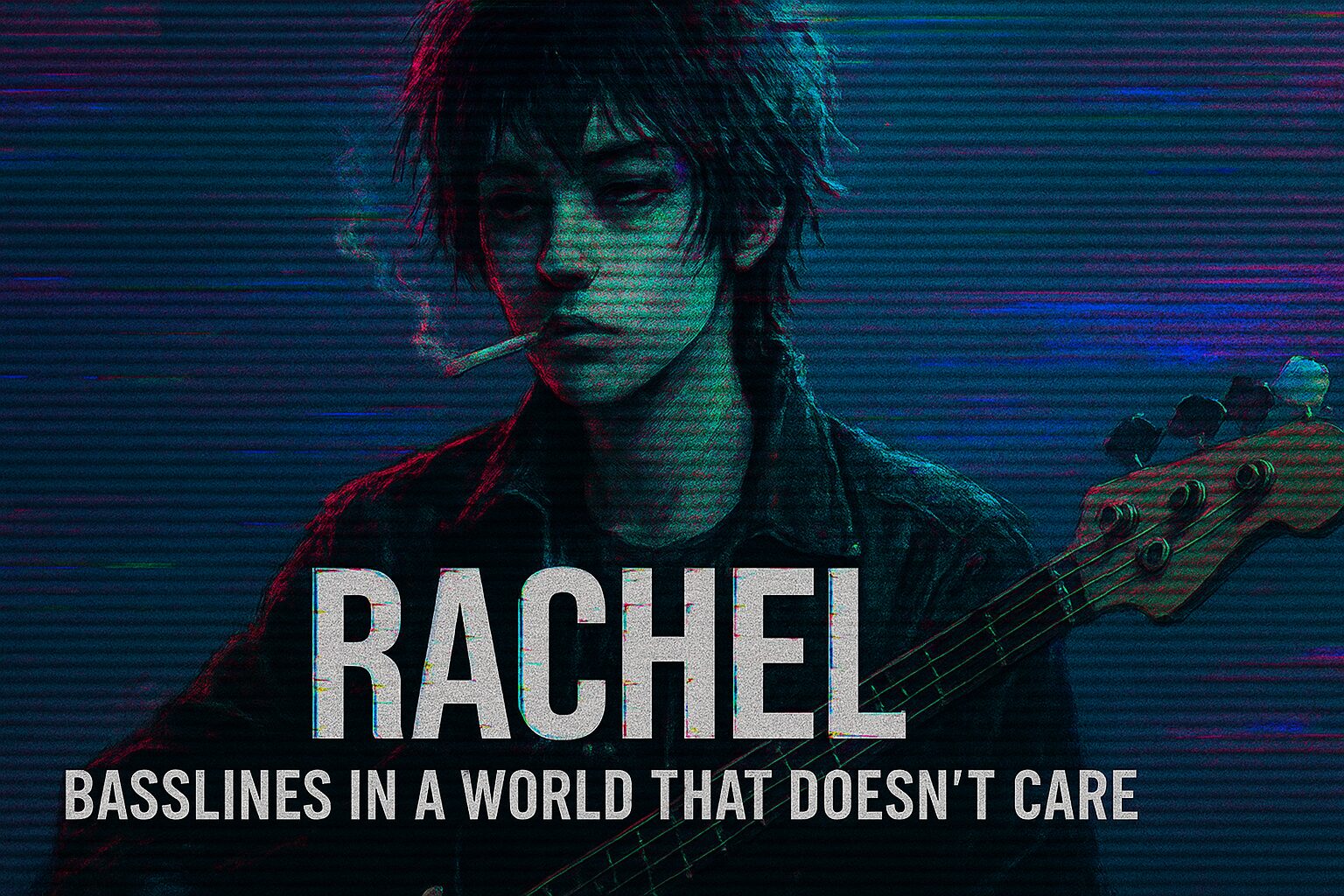Note: Rachel is a fictional character from the creative universe of “Rahab Punkaholic Girls.” This blog post is a work of fiction blending themes of urban detachment, punk subculture, and digital identity.
Chapter 1: The City That Never Felt Like Home
Rachel is 22 years old. He lives in a city that pulses like a machine but feels cold as steel. A place where glass towers pierce the clouds but no one makes eye contact. He doesn’t work. He doesn’t pray. He doesn’t smile unless it’s for a sarcastic cigarette break.
He exists.
“Existing is a kind of rebellion too.”
Rachel is part of the invisible generation—those who slipped between systems, who opted out without a fight, who prefer shadows over spotlights. And somehow, without asking, he became the bassist of Rahab Punkaholic Girls.
Chapter 2: A Presence That Refuses to Perform
Rachel doesn’t perform.
He stands. He plays. He doesn’t move. Yet every vibration of his bass cuts through the room like a quiet earthquake. While others rage and explode on stage, he’s still—anchoring chaos with low, heavy sound.
He’s the pulse. The gravity.
The stillness that makes the noise make sense.
“I’m not here to entertain. I’m here to hold the floor down.”
Chapter 3: The Anti-Hero of the Digital Age
He doesn’t believe in heroes.
Rachel scrolls through chaos daily—wars, memes, market crashes, influencers crying. None of it feels real. What’s real is the way his amp hums when it’s too close to a dying streetlight. What’s real is the drag of smoke across his lips.
He doesn’t create content. He doesn’t chase followers. But his presence in Rahab Punkaholic Girls has become cult-like. People resonate with what he doesn’t say.
“In a world that overshares, silence becomes sacred.”
Chapter 4: The Meaning of Nothing
Rachel doesn’t dream of success. He doesn’t want to be a star. He doesn’t even like the idea of the future. But he shows up to practice. He tunes his bass. He plays.
Because even in the absence of desire, there is rhythm.
He’s not lost. He’s adrift. And that, to him, is freedom.
Chapter 5: Music as Detachment, Not Escape
For Rachel, music isn’t an escape. It’s a mirror.
The more distorted the sound, the more accurate it feels. Basslines are the only truths he trusts—they don’t pretend to mean more than they are. They vibrate. They thrum. They exist.
“I don’t write lyrics. I write density.”
He’s not interested in telling stories. He’s interested in building gravity. Holding things down before they float away.
Chapter 6: The Role of Fictional Identity
Rachel isn’t real. He’s code. He’s concept. He’s the product of a world that needed someone like him to exist—even if only in story.
But isn’t that true of all of us?
In the age of avatars, handles, and profile pics, Rachel’s identity feels authentic because it never tries to be.
“If you think I’m empty, maybe you’re listening wrong.”
Chapter 7: Aesthetic of Apathy
His style? Whatever was on the floor. His hair? Messy. His eyes? Tired but alert. He smells like smoke and disinterest.
But when you see him on stage, something cracks. You realize he’s not lifeless—he’s overwhelmed by life and trying to survive it by being still.
His apathy is armor.
His detachment is defense.
Chapter 8: NFT and the Value of Silence
Rachel doesn’t understand NFTs. But his basslines have been minted. Limited-edition audio tracks. Low, grainy, deep.
Fans collect them not because they’re polished, but because they’re true. Honest noise in a world full of filters.
One NFT is just a minute of Rachel tuning his bass and exhaling. It’s one of the most traded pieces in their collection.
“Sometimes, the absence of a message is the message.”
Chapter 9: Band of Ghosts, Sound of Dust
In Rahab Punkaholic Girls, Rachel is the ghost. The background figure. The blurry silhouette in group photos.
But without him, the songs lose weight. The chaos floats away. His bassline brings the band back to earth, grounding distortion in something primal.
“They shout. I hum. That’s enough.”
Final Chapter: The Loudness of Stillness
Rachel may not scream. He may not care. He may not believe in anything. But when he plays, people stop scrolling. They listen.
Because his kind of silence is rare.
Because his nothingness is honest.
Because somewhere in all the fuzz and feedback, Rachel is a reminder that sometimes the most powerful signal is the one that doesn’t beg for attention.
“I’m not loud. I’m low. And low is where the truth hides.”
©2025 Rahab Punkaholic Girls Project — All characters and narratives are fictional. Any resemblance to real people is purely coincidental.



コメント